
by Olga Mecking | Feb 3, 2014 | 2014, Awareness, Being Thankful, Bilingual, Culture, Education, Expat Life, Humanitarian, Inspirational, Language, Life Lesson, Living Abroad, Millennium Development Goals, Motherhood, Moving, Netherlands, Philanthropy, Shot@Life, Social Good, Stress, World Motherhood
 Until a friend of mine had a terrible tragic accident in the Himalaya mountains that left her in a coma, I had never donated to a charity. We collected some money at our wedding to give to her husband, and my mom also donated some money to a charity that takes care of her, but that was it.
Until a friend of mine had a terrible tragic accident in the Himalaya mountains that left her in a coma, I had never donated to a charity. We collected some money at our wedding to give to her husband, and my mom also donated some money to a charity that takes care of her, but that was it.
Since moving to another country and having children, I have been looking for ways to help others. I want to donate to more charities. I am just looking for the right one.
It isn’t easy. I have heard of many charities that have turned out to be scams or which just took people’s money and ran.
My situation is especially difficult because I live in a foreign country and do not know about the charities here. Though my Dutch is fluent, I still have trouble communicating in this language sometimes. In the Netherlands, many people go house-to-house collecting money for charities.
I think it is interesting to find out about charities that way because they’re often ones I’ve never heard of before. They are often small scale actions rather than big ones. But I think the mistake they’re making is the following one: before I contribute, I’d like to find out more about the organization, whether my friends have heard of it, whether there is something about them that raises red flags.
I think I might even agree to donate money if they were willing to leave a business card or something I could find them by. Instead, they want me to make a monthly commitment. Again, because I do not know them, I am not so keen on giving them my credit card number.
At the same time, my heart breaks for all the little children going through invasive treatments; who are terminally ill; who look like little ghosts because they have lost so much weight from all their chemo; for all the sick people who can’t get the treatment they need; or for children who are not so fortunate as mine; or moms in poorer countries, who have to travel for many days if they want to give birth in a hospital.
I really want to help. Since I became a mom and later a World Moms Blog contributor, I have been made aware of needs and dreams that can’t be fulfilled because of the bad conditions all around the world.
But the fact is that finding the right charity isn’t easy. I mostly say no to these door-to-door people. I do it with a heavy heart. I just want to make sure that I am really helping people in need, and not wasting my money.
Luckily, while looking for a charity to donate to, there is a lot I can do:
- In my circle of friends alone, there have been situations where help was needed, including domestic violence and pregnancy problems.
- I am considering taking the Shot@Life pledge and becoming a Champion.
- I can learn as much as I can about actions such as #MDG’s and participate in our Twitter Parties.
- I can find local communities, organizations, charities and brands.
- Many of my friends are absolutely talented people and use their talents to collect money for a good cause, and I can help them spread the word and participate.
I know this sounds like nothing, and I am not telling this to show off how good of a person I am. It is just to show that even though it sounds like nothing, we all can make a difference. I am still very new at this social good cause. I still have a lot to learn. Already I have asked my fellow World Moms Blog contributors for help choosing a charity I can actually trust and they have come up with great charities.
I need to do more. I want to do more. I will do more.
Do you have a charity or cause worth supporting? Tell us about it and help spread the word
This is an original post to World Moms Blog from Olga Mecking in The Netherlands.
The image used in this post is credited to Images Money. It holds a Flickr Creative Commons attribution license.
Olga is a Polish woman living in the Netherlands with her German husband. She is a multilingual expat mom to three trilingual children (even though, theoretically, only one is trilingual since she's old enough to speak). She loves being an expat, exploring new cultures, learning languages, cooking and raising her children. Occasionally, Olga gives trainings in intercultural communication and works as a translator. Otherwise, you can find her sharing her experiences on her blog, The European Mama. Also take a while to visit her Facebook page .
More Posts - Website
Follow Me:




by Susie Newday (Israel) | Jan 29, 2014 | 2014, Communication, Israel, Life Balance, Relationships, Stress, Susie Newday
*I wrote this a while back when I was on the verge of losing my mind because of all the thoughts and doubts in my head. On an emotional level, I was living in a state of survival. I felt uptight and tense all the time and I was barely keeping it together. To the world none of that was apparent. I was functioning, maybe even too well. After a lot of hard work, I am not in that place anymore, which is why I guess I feel it is safe to share this now. Sure I still have my self doubts and difficulties, we all do, but these days I don’t feel like I’m living every day in survival mode.
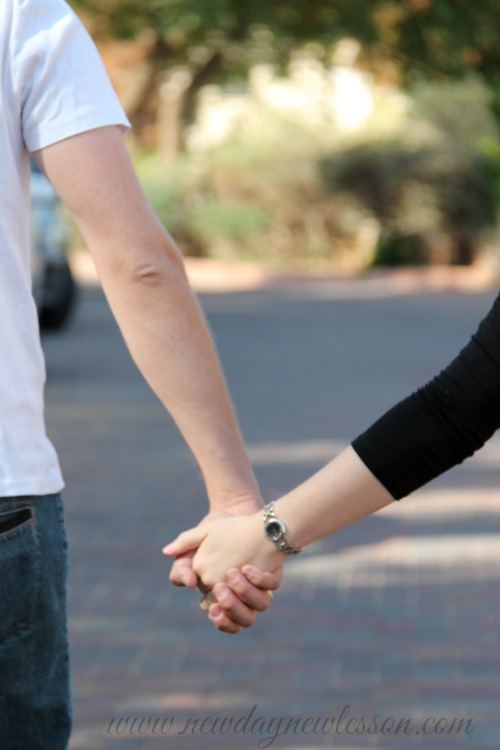 Our lives are full of people. Unless we live like a hermit shut away from human interaction, we have no choice but to engage in human contact, both physical and verbal, numerous times on a daily basis. There are all kinds of people out there. There are those we like more, there are those we like less. There are people we despise or maybe we just think we do. And, because we are lucky there are also people whom we love.
Our lives are full of people. Unless we live like a hermit shut away from human interaction, we have no choice but to engage in human contact, both physical and verbal, numerous times on a daily basis. There are all kinds of people out there. There are those we like more, there are those we like less. There are people we despise or maybe we just think we do. And, because we are lucky there are also people whom we love.
Since I know there is someone in your life you love, I want you to close your eyes and take a moment to think about them. If you want, it can be someone you just like or admire not necessarily love. Have you pictured them well? Do you have a smile on your face?
Now comes the hard part. Why do you feel that way about them?
That question came out of my desire to understand why someone would love or like me. What is it about me or what I am doing that would cause someone to stop and say, hey I like her. And I don’t know if the answer that came to me is the truth and whether it my way of trying to explain away something that can’t be quantified and explained.
Simply put, I think people like/love/admire us for the things we do for them and for others. They like us because of the way we make them feel about themselves. Why do we love our children from the moment we set eyes on them after they’ve been born? Because just by being born they have done something for us. They have given us a new job, a new purpose, new meaning in our lives.
We all want to feel loved. We all want to have the security and comfort of knowing there is someone we can lean on. I’m saying we can’t be loved if we don’t love. We won’t have someone to lean on unless we are there for others. We all want to feel taken care of yet we won’t have that unless we take care of others.
Sometimes it feels like love is tiring. You have to do all the time. Love is work. And I wonder, if I stop, will I still be loved?
Would you still love me
If I had nothing left to give,
If I had no energy to take care of you
If I had nothing you really needed?
Would you still love me
If I didn’t feed you or clean up,
If I didn’t offer my help
If I didn’t seem to care?
Would you still love me
If my mind wasn’t quite as sharp
If I embarrassed you
With my confusion or bursts of anger?
Would you still love me
If my smile left my face forever
If my words went mute
And the music in my soul faded?
Would you still love me
Because of all I once was,
Even if now there was nothing recognizable
About the person sitting before you?
Would everything I have done until now
Be enough for you to still love me?
Love, the age old question
Pondered while hovering over the the precipice of self doubt.
I’m afraid to stop doing, to stop caring, to change the rules that have been golden up until now. I’m afraid to sway the balance of love and acceptance. I’m afraid if I do that I won’t be loved.
I yearn for unconditional love, to be able to give with truly no strings attached and to know that I am loved without having to do anything at all, just because I am a person who has a heart full of love. Is unconditional love just a fantasy residing in empty words or are we really capable of pure love? I wish I really knew.
What I do know, is that first of all I have to love myself, no strings attached. And when I feel like withdrawing, I need to love more.
Why do you think you love and are loved?
This is an original post by World Moms Blog Africa & Middle East Regional Editor, Susie Newday in Israel. You can also find her on her blog New Day New Lesson.
Photo credit to the author.
Susie Newday is a happily-married American-born Israeli mother of five. She is an oncology nurse, blogger and avid amateur photographer.
Most importantly, Susie is a happily married mother of five amazing kids from age 8-24 and soon to be a mother in law. (Which also makes her a chef, maid, tutor, chauffeur, launderer...) Susie's blog, New Day, New Lesson, is her attempt to help others and herself view the lessons life hands all of us in a positive light. She will also be the first to admit that blogging is great free therapy as well. Susie's hope for the world? Increasing kindness, tolerance and love.
You can also follow her Facebook page New Day, New Lesson where she posts her unique photos with quotes as well as gift ideas.
More Posts - Website
Follow Me:






by Tinne from Tantrums and Tomatoes | Jan 27, 2014 | 2014, Being Thankful, Belgium, Communication, Health, Life Balance, Life Lesson, Motherhood, Pregnancy, Relationships, Stress, Tantrum and Tomatoes, Women's Rights, Working Mother, World Motherhood

If you Google bullying, there is a whole plethora of websites to choose from. Most of them deal with how to prevent your kid from bullying, how to react when your kid is bullied/being a bully, how to talk to your child about bullying.
But what if it is you—a fully grown adult—who are being bullied and there is really nothing you can do about it because the bully is also an adult…and your boss? And you cannot afford to lose your job.
Here is the situation: years ago I worked for a small, family owned business (You will understand why I do not name any names). I can best describe my boss as the Belgian cousin of Miranda Priestly, the Devil-boss who wore Prada. Believe me she had her down pat. From the sneering “that’s all,” the calls outside work hours, the berating because I could not divine her thoughts and causing her to suffer the indignity of having to actually tell me what was expected, the pout…
Oh yeah, they were related all right.
After little more than a six months, I was actively looking for another job. And then, a week before I planned to resign and tell her to go do something to herself, I found out I was pregnant. And the game and the world as a whole changed completely.
We had just started building our house, there was no way my husband’s salary would cover all the bills and finding a job while you are pregnant is not easy.
So I stayed on. But it was obvious right from the start that they did not like the idea of having a young mother as employee.
Since I was competent at my job they had no reason to fire me outright and because Belgian legislation is rather protective towards pregnant women in the workplace, it became almost impossible to fire me when I handed over the medical bill announcing my pregnancy.
And so the bullying started.
Little things at first. Saddling me with a huge amount of work half an hour before I was due to clock out. Making a mess of the client contact database, insisting it was my fault, even though there was actual proof that it wasn’t.
But when they noticed that I was relatively unaffected things got BAD. In capitals.
While the company was closed for the summer holidays I got a letter detailing every little thing that I had done wrong after I announced I was pregnant. And I really mean everything, like putting one (1!) sheet of paper for an invoice the wrong way up in the printer causing them the loss of a whole eurocent in paper because I had to reprint the page. After that it got even worse than you can imagine. Belittling me in front of clients, calls at all hours, at all times, screaming, yelling, throwing. One day I came into the office to find that my boss had emptied my trashcan all over my desk. Fun times… I can tell you.
You must wonder how I dealt with the situation. Well, I hate to disappoint you, but I did not deal with it.
No, that is wrong. I did deal with it, but not in the way you might imagine. I did nothing.
I showed up for work, I let them scream, I let them yell, I let them belittle me, when they called at 6am on a Sunday I answered the phone and made no complaint. Nothing. When I arrived at the office I did my job. Business as usual.
This was my defense strategy. I did my job and because I continued to do it well, they never had an excuse for firing me.
Yes, I could have filed a complaint for harassment and started a legal procedure. I even started collecting evidence in case I should one day be forced to do so. Chances are very good I would have won, since the evidence was pretty rock solid. Yet, this was never really my intention. I was 29 at the time and legal procedures in Belgium can take a looooooooooooooooooong time. Dragging my employer to court would take ages, it would cost a lot of money and it is the kind of thing which haunts you forever. I still had my way to make in the world, my career was just beginning. A court case was likely to follow me around for my whole life and I did not wish to bring this kind of baggage with me.
I collected—and still keep—the evidence just in case.
In retrospect, I should have gone to my doctor, explained the situation and asked him to declare me unfit for work. But I did not do that. As soon as it was legally possible I resigned and the happy dance I did on my last day of work might have come straight out of a Broadway musical. I never looked back.
Has this situation ever happened to you? What did/would you do?
This is an original post to World Moms Blog from our writer in Belium, Tinne of Tantrum and Tomatoes.
The image used in this post is credited to Elizabeth Atalay.
Born in Belgium on the fourth of July in a time before the invention of the smart phone Tinne is a working mother of two adorably mischievous little girls, the wife of her high school sweetheart and the owner of a black cat called Atilla.
Since she likes to cook her blog is mainly devoted to food and because she is Belgian she has an absurd sense of humour and is frequently snarky. When she is not devoting all her attention to the internet, she likes to read, write and eat chocolate. Her greatest nemesis is laundry.
More Posts - Website
Follow Me:



by Ecoziva (Brazil) | Jan 20, 2014 | 2014, Being Thankful, Brazil, Childhood, Education, Family, Inspirational, Kids, Life Lesson, Maternal Health, Motherhood, Parenting, Relationships, Womanhood, Working Mother, World Motherhood
 You know how someone can tell you something that you already knew but in just such a way that finally something “clicks” inside you?
You know how someone can tell you something that you already knew but in just such a way that finally something “clicks” inside you?
That is what I felt when I read Argentinean psychotherapist, Laura Gutman’s, work recently. Laura Gutman’s books are best-sellers in several Spanish speaking nations, where she is known for promoting conscious mothering.
Three of her books have been translated into Portuguese, of which one has also been published in English. I had heard so many good reviews of this particular one (Maternity, coming to face with our own shadow) that I bought it as a Christmas gift for a friend, who is planning on getting pregnant soon. For another friend, I bought a second one, whose title seemed interesting – it could be roughly translated as The power of maternal discourse.
I confess that – after three kids (including a baby), having read tons of parenting books and with restricted time for reading anything unrelated to work – I didn’t plan on tackling either anytime soon. I didn’t really think there would be anything new. However, when I picked up The power of maternal discourse I couldn’t stop. And immediately after I finished I read Maternity...
Yes, a lot of it was not new to me and some parts I did not fully agree with. Yet, overall the way she said it (and all of the case studies she used as examples) made such a difference that it produced somewhat of a revolution in my life, especially in three areas: my relationship with my mother, my relationship with myself and my relationship with my children. In this part I would like to talk about how it affected my relationship with my mother.
For starters, my relationship with my mother wasn’t exactly affected in a positive way, at least not in practice. In fact, we had a huge fight right after I read the book which ended up in us not spending Christmas together. Yet, although unpleasant, it was necessary as we both said things that had been kept inside for years.
One of the main arguments of The power… is that our own personal story is mostly constructed by what the dominant adult in our childhood (usually our mother) said, which is not necessarily accurate or entirely true. Thus, Gutman states, the unsaid truths are often what hold us back, producing our so-called “shadow”.
For those of you unfamiliar with the concept of shadow, it would be our unfaced “dark side”, a side we try to suppress or deny, often at high cost. Additionally, as other authors have argued, we must try to understand, accept and learn from our shadow, and one way to do that would be by trying to reconstruct and examine our true life story.
The power… is not an optimistic book. In fact, from her decades as a therapist, the author believes most people’s lives have been tainted by some sort of childhood abuse. Of course her definition of abuse is ample, yet the examples she brings are quite distressing.
I guess what resonated most with me were her writings on “childish mothers”. More specifically, how many mothers – despite providing adequate physical care for their children and apparently being present – are often emotionally absent and overly self-involved, which results in the child carrying out the mother’s role in many situations. Then, when this child becomes a mother (or a father) the unresolved child within them will make them act childish and emotionally unavailable with their own child(ren) and so on.
Although her ideas were not exactly new, as I said, for some reason many things finally clicked. When adults we all know are parents are flawed and we might even understand and forgive these flaws, yet in practice these flaws may still be hard to deal with. Although we may rationally believe that our mother/father did the best they could to raise us, with the tools and knowledge they had at that moment in their lives – the hurt child in us might still dominate our emotions in practice.
In my case, many things I carried around as being my “fault” were really my mother’s responsibility, and that was surprisingly hard to admit and accept.
On the other hand, Gutman encourages us to step into the adult we are now and make our own choices by understanding and accepting the truth about our past. And hopefully engaging in a better relationship with ourselves and with our own children, which is what I am trying to do now!
And you? How have you dealt with issues related to your own parents? How has resolving (or not) these issues helped you in your relationship with your children?
This is an original post to World Moms Blog from our writer in Brazil and mother of three, EcoZiva.
The image used in this post is credited to photographer martinak15. It holds a Flickr Creative Commons attribution license.
Eco, from the greek oikos means home; Ziva has many meanings and roots, including Hebrew (brilliance, light), Slovenian (goddess of life) and Sanskrit (blessing). In Brazil, where EcoZiva has lived for most of her life, giving birth is often termed “giving the light”; thus, she thought, a mother is “home to light” during the nine months of pregnancy, and so the penname EcoZiva came to be for World Moms Blog.
Born in the USA in a multi-ethnic extended family, EcoZiva is married and the mother of two boys (aged 12 and three) and a five-year-old girl and a three yearboy. She is trained as a biologist and presently an university researcher/professor, but also a volunteer at the local environmental movement.
More Posts
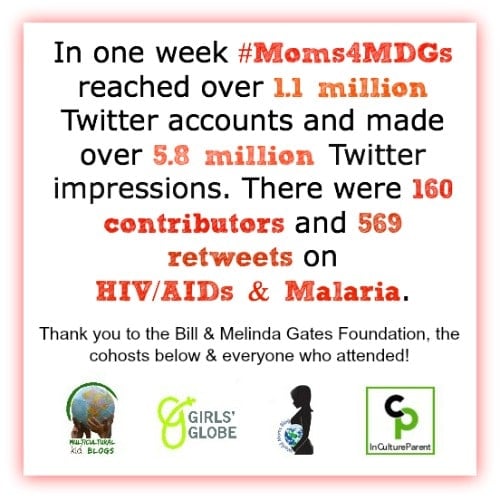
by Jennifer Burden | Jan 16, 2014 | 2014, Social Good, World Moms Blog, World Voice
 So what kind of impact can you make with a Twitter party for social good?
So what kind of impact can you make with a Twitter party for social good?
Last night, after our #Moms4MDGs chat, we ran a TweetReach report.
In the past week, our collaborative efforts under the #Moms4MDGs hashtag have reached over 1.1 million Twitter accounts and made over 5.8 million Twitter impressions. There were also 160 contributors to the hashtag and 569 retweets. Tweeters from North America, South America, Europe and Africa joined in!
The #Moms4MDGs campaign was announced last July at the BlogHER conference’s International Activist’s Panel by World Moms Blog Senior Editor, Purnima Ramakrishnan, in Chicago, Illinois, USA. We were answering the call to action to keep moms engaged with the world’s goals on topics such as eradicating extreme poverty and empowering women and girls. There are 8 Millennium Development Goals, and we have been covering one per month and have teamed up with a different organization each month that works year-round toward a particular goal.
The topic of yesterday’s #Moms4MDGs chats was on the UN’s Millennium Development Goal #6, to combat HIV/AIDS, malaria and other diseases. The key to tackling the world’s most pressing problems is teamwork. In the first party, we were joined by cohosts, Multicultural Kid Blogs, InCulture Parent Magazine, Girls Globe and our featured organization of the month, The Bill and Melinda Gates Foundation, who tweeted from @gateshealth.
World Moms Blog and our contributors got the party started by welcoming guests!




Then we passed the baton to cohost Multicultural Kid Blogs, who educated us on the targets for HIV/AIDS and statistics on progress and what still needs to and can be done to fight the disease.



(By the way, the answer is c.)
This was a very popular and important tweet from the HIV/AIDS discussion:

Next, the baton was passed to cohost InCulture Parent Magazine, who announced the targets for malaria, the seriousness of the disease, and what can be done to help.

The UN Foundation and their campaign, Nothing But Nets, entered the twitter feed, which was really helpful to the conversation.


And the smart people chimed in!

Great tweets on malaria from the PM chat:



Some moms were already connecting with Nothing But Nets during the chat about getting their children involved in #MDG6! (This made us feel great!!)
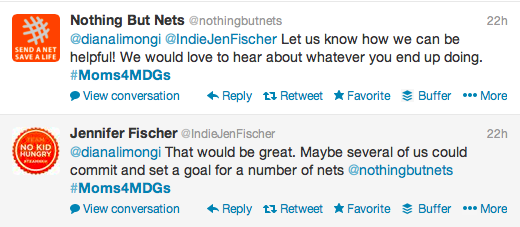

And more great conversations!
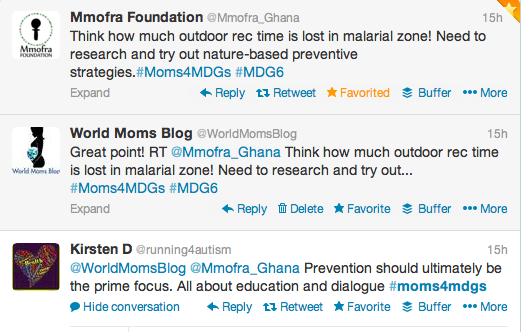 And…
And…
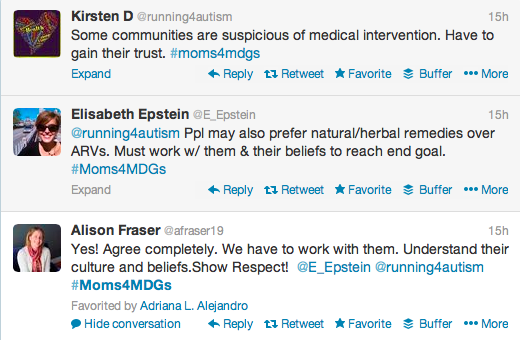
Then, cohost Girls Globe took the baton and asked the party some powerful questions to stir up ideas and action towards #MDG6.

The Shot@Life campaign was also present and invited people to join them in the fight against disease and to become a Shot@Life champion when Girls Globe asked how moms of the world could get involved to reach #MDG6 goals.

And Girls Globe brought up tech and MDG goals!


Our interview was cut short during the first party with @gateshealth, but it left everyone something to come back for later that evening! Later, we learned how the Bill and Melinda Gates Foundation came about and more about their global blog, Impatient Optimists.

And, they provided a mind-blowing statistic on polio, given that India was just declared polio-free for 3 years in a row this week.

But, perhaps, The Bill & Melinda Gates Foundation’s biggest, most powerful message on #MDG6 was this:

With two months still left in the 8 month #Moms4MDGs campaign, we are thrilled about how much MDG8, a global partnership for development, has played a role in all the parties throughout. World Moms Blog is proud to be meeting interesting people on Twitter, connecting with other websites geared up to make a difference and partnering and featuring foundations that are making year-long contributions to the vital goals to end extreme poverty and increase global health that the world has set.

Our next twitter party takes place on February, 15th, 2014 on MDG7, the environment from 1-2pm EST. We hope you will come out and join the momentum. Mark your calendars…!
This is an original post by World Moms Blog Founder, Jennifer Burden in New Jersey, USA.
Photo credits to the author.

Jennifer Burden is the Founder and CEO of World Moms Network, an award winning website on global motherhood, culture, human rights and social good. World Moms Network writes from over 30 countries, has over 70 contributors and was listed by Forbes as one of the “Best 100 Websites for Women”, named a “must read” by The New York Times, and was recommended by The Times of India.
She was also invited to Uganda to view UNICEF’s family health programs with Shot@Life and was previously named a “Global Influencer Fellow” and “Social Media Fellow” by the UN Foundation. Jennifer was invited to the White House twice, including as a nominated "Changemaker" for the State of the World Women Summit. She also participated in the One Campaign’s first AYA Summit on the topic of women and girl empowerment and organized and spoke on an international panel at the World Bank in Washington, DC on the importance of a universal education for all girls. Her writing has been featured by Baby Center, Huffington Post, ONE.org, the UN Foundation’s Shot@Life, and The Gates Foundation’s “Impatient Optimists.” She is currently a candidate in Columbia University's School of International and Public Affairs in the Executive Masters of Public Affairs program, where she hopes to further her study of global policies affecting women and girls.
Jennifer can be found on Twitter @JenniferBurden.
More Posts - Website
Follow Me:


by Jill | Jan 15, 2014 | 2014, Africa, Being Thankful, Cultural Differences, Expat Life, Family, Food, Living Abroad, Motherhood, Poverty, World Motherhood
It used to be so easy.
A $30 box of Rice Krispies was worth writing home about. Sewing pillowcases from pagne fabric was so exciting that I had to Skype my friend in Virginia. Our morning oatmeal topped with cheap passion fruit was worthy of photographic documentation.

I couldn’t stop collecting stories from the new people who suddenly surrounded me. I clearly remember walking to my neighbor’s house one night thinking excitedly, “I am walking…in Africa!” and wondering if I should write a poem.
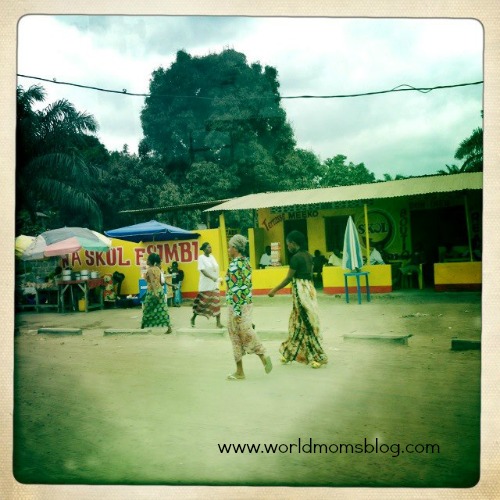
Now, everything about my life seems either too complex to describe, or just not worth it. A few weeks ago I tried to write a fluff piece about the blue tins of Nivea lotion that are ubiquitous around Kinshasa and before I knew it, I was going on about globalization. Other things, I just forget to mention. I don’t notice anymore that it’s weird to pay $40 for laundry detergent, soak your veggies in filtered water and vinegar, stop your car conversation briefly to say “pas aujourd’hui” to a seven-year-old beggar, or pop a live worm out of a person’s skin. These events are ticked off neatly in the daily rhythm of life. I don’t honor them with the thought I once did.
When I sit down to write about my life in Kinshasa, my mind is blank. Sometimes I tell myself that this sudden block is self-preservation. After almost three years, the compounding effects of this city are just too much. In order to function as a nurse and a teacher and a mother and a friend and wife, I can’t stop and ponder every injustice; whether it’s my righteous indignation at the price of the imported fruits I can very well afford to buy, or the story my gardener tells me about the three pregnant teenagers he and his wife feed every day, sometimes giving up their own portion of dinner to do so.
At other moments, I pardon myself by remembering that my lack of enthusiasm is the natural progression of time and familiarity. The honeymoon period with Africa has passed and now I’m just living life. No wonder I don’t hold my pillowcases in rapt reverence anymore. They’re just my red and white pillowcases, getting a little grimy and thin with age. The sellers of trinkets tap at my car windows and I greet those that I know with an open window and a few words and ignore the others. It’s not dramatic, it’s the way to the grocery store.
Then there are the times I berate myself. I’ve become comfortable in my pretty bubble. I let it happen. I cancel French lessons to go to kickboxing class. I allow my housekeeper to buy fruits and veggies for me instead of trekking down the hill to the market and doing it myself. I haven’t learned Lingala. I’ve never seen where the woman who helps me raise my children lives. I’m ridiculous for not being able to write about the Congo. I’m not satisfied with rice and beans and spend hundreds of dollars on imported food that sometimes goes bad before it’s eaten. I don’t listen enough and complain too much. Just another expat.
My parents came to visit Kinshasa just after Christmas – their first time. I felt sad that I couldn’t seem to muster excitement for showing them “our life in Africa.” I couldn’t seem to tap into that newcomer’s elation and share it with them. I hardly took any photos (usually an obsession) and was uninspired by the shots I did snap. My suggestions for food, sights, and experiences were halfhearted. I couldn’t figure out what to do. Even in retrospect, I can’t figure out what I could have done to give them a more authentic experience of my home – which I consider to be wonderful in so many ways. Trying to provide a planned glimpse into my contradictory life proved impossible.
Congo is often described as a country of vicious contradictions: a land bursting at the seams with diamonds, coltan, and fertile dirt yet home to some of the poorest people on earth. NGO workers throw up their hands in frustration and spit nails about failed projects over too many drinks at night. Many of my Congolese friends struggle with the creeping knowledge that they’ve always truly believed it will get better, and it never has. No one I’ve asked has any great ideas. Everyone is just doing the best they can.
I’m not sure what to do with the reality of the Congo I know, so I do the very best I can. Sometimes, that means that I throw myself into the stories of those around me, asking questions I know will lead to heartbreaking tales. Sometimes I read Celebrity Baby Blog instead of Congo Siasa. Sometimes I eat beans and rice. Sometimes I complain loudly about the price of my cereal and buy the box anyway. Sometimes I talk incessantly about the number of mothers and babies who die in this country every day to people who I know are not interested. Sometimes I hear my daughter speaking Lingala and smile proudly.
Sometimes I fret that when I no longer live in Kinshasa, all I will want to do is live in Kinshasa.

What things about your life are too complicated to talk about or even ponder?
This is an original post written for World Moms Blog by Jill Humphrey. You can find Jill blogging with Sarah Sensamaust at Mama Congo.
Photo credits to the author.

 Until a friend of mine had a terrible tragic accident in the Himalaya mountains that left her in a coma, I had never donated to a charity. We collected some money at our wedding to give to her husband, and my mom also donated some money to a charity that takes care of her, but that was it.
Until a friend of mine had a terrible tragic accident in the Himalaya mountains that left her in a coma, I had never donated to a charity. We collected some money at our wedding to give to her husband, and my mom also donated some money to a charity that takes care of her, but that was it.












 So what kind of impact can you make with a Twitter party for social good?
So what kind of impact can you make with a Twitter party for social good?
















 And…
And…















